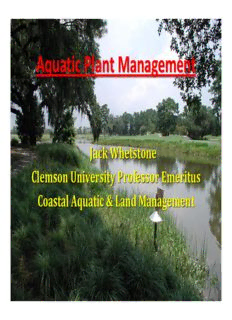
Aquatic Plant Management PDF
Preview Aquatic Plant Management
Aquatic Plant Management Jack Whetstone Clemson University Professor Emeritus Coastal Aquatic & Land Management Managing A Pond is Like Farming • Soil is Important • Liming and Fertilizing Increases Production • “Seed /Stocking Rate” Determines Productivity • Prevention Best Weed Control • Weed ID Critical • Herbicides are Weed Specific • IPM Best Weed Management • Proper Harvest Keeps You in Business Integrated Aquatic Weed Management Jack Whetstone Clemson Extension Service SC Sea Grant Extension Program Clemson University Baruch Institute Importance of Aquatic Plants • Food, shelter, resting, and breeding habitat for fish, waterfowl, and other wildlife • Protection against shoreline erosion • Oxygenation of water • Aesthetics Why Do Aquatic Plants Become Weeds? • Clear, shallow water • Nutrients, particularly N and P • Lack of natural enemies (introduced weeds) • Metabolic characteristics greater than native plants How Do Aquatic Weeds Get Into a Pond or Lake? • Intentional or accidental results of human activities (wildlife plantings, boating, fishing enhancement, aquarium dumping, water gardens, dredging, mechanical harvesting) • Animals (wading birds, aquatic mammals) • Water movement (tides, currents, waves) • Transport by wind and rain Why Do We Have to Manage Aquatic Weeds in South Carolina? To prevent interference with: • Irrigation • Aesthetics • Drainage • Aquaculture • Flood control • Transportation • Water supplies • Mosquito control • Power • Fishing/Recreation generation General Groups of Aquatic Plants • Algae • Mosses • Ferns • Vascular plants Aquatic Plants Classified According to Growth Habit • Submersed • Free-floating • Floating-leaved • Emergent Types of Algae • Planktonic • Filamentous • Macroalgae
Description: